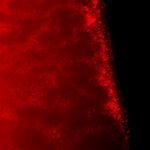Link to Pubmed [PMID] – 1301645
Therapie 1992 Nov;47(6):531-9
Potent and selective CCK-B agonists with good bioavailability have been designed by modifying the natural CCK-8 peptide. Thus, BC 264 [Boc-Tyr(SO3H)-gNle-mGly-Trp-Me(Nle)-Asp-PheNH2] is a highly potent (0.15 nM) and selective agonist for CCK-B receptors which cross the blood brain barrier. Following i.v. injection of [3H]pBC 264 in mouse, the ligand was found in its intact form in brain tissue. Analgesic studies and in vivo binding experiments have shown that the CCKergic system could modify the release of endogenous enkephalins, whereas mu and delta opioid receptor activation modulates the release of endogenous CCK. Behavioural studies performed after local injection of CCK-8 or BC 264 into the postero-median part of the nucleus accumbens have shown the involvement of CCK-A receptors in motivation and/or emotional states of rats. In the anterior part, CCK-B receptor stimulation could be involved in attention and memory processes. BC 264 systemically administered in mice increased fear and/or “anxiety” in the black and white box test. In the elevated plus maze, BC 264 increased the emotional responses of the “anxious” rat and decreased these responses in “non anxious” animals. These results suggest that endogenous CCK could play a critical role in mood modulation through CCK-A/CCK-B receptor stimulation. Dysfunctioning of the CCK-A/CCK-B pathways could be implicated in anxiety and panic attacks.

